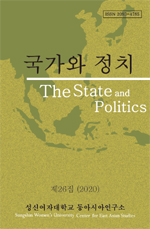기업 격차와 한국 중소기업의 취약성
Firm-Size Differentials and the Vulnerability of SMEs in Korea: A Comparative Analysis with Japan
- 성신여자대학교 동아시아연구소
- 국가와 정치
- 제26집
-
2020.0275 - 102 (28 pages)
- 112

본고의 문제의식은 한국 중소기업은 왜 대기업에 비해 약할 수밖에 없는지에 대한 의문에서 출발한다. 특히 유사한 공업화 단계를 거친 일본의 중소기업과 비교의 관점에서 그 이유에 대해 고찰하였다. 먼저 양국 중소기업의 비중에 관해 기업 규모별 차이에 초점을 맞추어 살펴보았다. 이를 통해 주로 노동생산성 격차 때문에 발생하는 기업 규모별 임금 격차의 정도가 한국 중소기업에서 더 크게 나타나고 있다는 점과, 2000년대에 들어서 양국에서의 중소기업과 대기업의 임금 격차가 확대되고 있다는 점을 발견할 수 있었다. 분석 시각으로 문제형 중소기업관에 입각한 억압론의 관점과 중소기업의 내부구조에서 원인을 찾는 취약론의 관점을 제시하여 그 합리성에 대해 검토하였다. 그 결과 대기업이 강하기 때문에 중소기업은 약하게 된다는 억압론의 관점은 중소기업과 대기업의 거래 관계에서 정합성을 가지며, 중소기업 내재하는 문제 때문에 대기업에 비해 약하게 된다는 취약론의 관점은 인적 자본의 확보 측면에서 정합성을 가진다는 점을 알 수 있었다. 이를 통해 향후 한국 중소기업 정책의 방향으로 중소기업의 생산성 제고를 위한 지원 정책, 하청관계의 불공정성을 완화시킬 수 있는 정보의 제공이 필요하다는 점을 주장하고 있다. 정책뿐만 아니라 중소기업 취약성의 주요한 원인 중의 하나인 고용의 안정성을 확보하기 위해서는 결국 기업의 자조 노력도 어느 정도 필요하다는 점도 아울러 제언한다.
This paper starts with the question of why Korean Small and Medium-sized Enterprises(:SMEs) are forced to be weak as compared with large enterprises. In particular, the paper examines the reason with comparison of Korean and Japan, which have grown through similar industrialization stages. At first, I address on the changes in the long-term trends, focusing mainly on firm-size differentials. Through this, I was able to seek findings that the level of wage differentials between companies by size is larger than that of Japan, and that firm-size differentials between small and large companies have been widening in the 2000s. In this paper, I discuss on the rationality of the suppression approach and vulnerability one based on internal structure of SMEs. As a result, the paper found that the former that SMEs become weak as large companies are too strong is persuasive in the subcontracting with large ones and, the latter that the weak structure inherent in SMEs makes themselves weaker is convincing in terms of securing human capitals. I argue that the SME policy in Korea is necessary to provide supportive packages for enhancing productivity of SMEs and information that can ease unfairness in subcontracting. Also, that self-help efforts at business field are needed for job security, which is one of the main causes of vulnerability.
Ⅰ. 문제 제기
Ⅱ. 한일 중소기업의 지위와 격차
Ⅲ. 억압론 : 기업간 거래 관계
Ⅳ. 취약론 : 인적 자본 측면
Ⅴ. 결론 및 정책적 함의
(0)
(0)